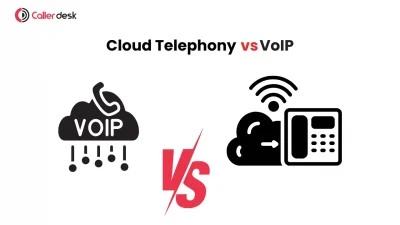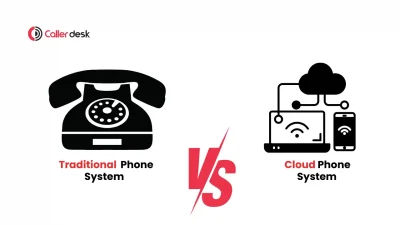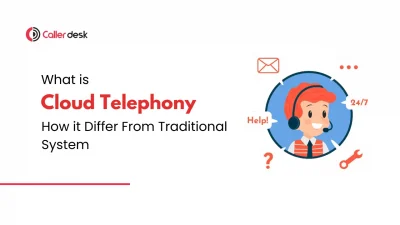The pandemic has changed our daily lives and workplace surroundings. While some aspects have returned to normal, the way businesses operate has undergone a lasting transformation. Both organizations and employees have recognized the cost savings and convenience offered by flexible work-from-home or work-from-anywhere models, which have now evolved into hybrid systems.
During the remote work phase, companies relied on cloud telephony providers to manage various tasks regardless of location or device, such as handling communications, tracking client feedback, and automating voice messages. These applications have reduced budget strain and revolutionized communication processes. As a result, the cloud telephony market is expected to grow at a CAGR of 9.5% from 2022 to 2032 (FutureMarketInsights).
Benefits of Cloud Telephony for Business
1. Ease of Installation and Integration
Setting up traditional on-site call centers requires substantial time and investment in infrastructure and hardware. In contrast, cloud telephony is much easier to install, needing only an internet connection and a web browser. Once set up, you can access the software via mobile devices or any internet-connected desktop.
These applications integrate smoothly with business communication systems and are compatible with most CRM and helpdesk tools like Salesforce and HubSpot. This seamless integration allows you to work from a single platform without constantly switching between applications.
Cloud telephony systems also integrate with:
- Email inboxes
- Sales automation tools
- Web apps
- CRM systems
- Helpdesk software
- eCommerce platforms
- Online surveys
- Quality assurance tools
- Chat tools
2. High Mobility and Flexibility
Employees can be productive and connected on the road using cloud telephony, whether they are in the field or working flexible hours throughout the world. You can stay connected across continents with one contact number using your smartphone or laptop, ensuring you never miss a call or meeting, even when on the move.
3. Cost Efficiency
Cloud-based telephony reduces maintenance costs associated with on-premise systems like PBX. Smartphones, laptops, and other digital devices used by your employees are sufficient, eliminating the need for expensive hardware. Additionally, you save on rental costs for large spaces required by traditional PBX systems.
4. Oversight Over All Business Communication
Traditional desk phones do not allow for tracking business communications like sales calls or service inquiries. Cloud telephony addresses this issue with call recording features, enabling you to keep records of all incoming and outgoing calls. These records are invaluable for training and quality purposes, helping to prevent repetitive mistakes.
Integrated cloud telephony CRM solutions collect operational data like:
- Response times
- Average number of calls made
- Call volumes
- Inbound call channels
- Sales performance
This data helps measure employee KPIs like productivity and response time, optimizing business processes.
5. Future-Ready Telephony Solutions
Cloud telephony providers like CallerDesk enable you to scale and expand your business without additional infrastructure costs. The cloud-centric database allows you to add users, virtual numbers, and call flows as needed. Regular automatic updates ensure the system remains current and secure, eliminating worries about obsolescence.
Industry-Specific Examples
1. Healthcare
Healthcare providers can use cloud telephony to manage patient calls, schedule appointments, and provide telehealth services. The integration with CRM systems ensures that patient information is readily available, improving the quality of care and communication.
2. Retail
Retail businesses can benefit from cloud telephony by handling customer inquiries, processing orders, and managing customer service efficiently. The call recording feature helps in training staff and improving customer interactions.
3. Finance
Financial institutions can use cloud telephony to provide customer support, handle transactions, and ensure secure communication. The advanced security features protect sensitive financial data and comply with industry regulations.
4. E-commerce
E-commerce companies rely on cloud telephony to handle high volumes of customer interactions, including order confirmations, delivery updates, and return requests. Features like virtual numbers and automated outbound calls help maintain smooth and professional communication across regions.
5. Education
Educational institutions use cloud telephony for admissions inquiries, scheduling classes, and sending reminders for fees or events. The ability to integrate with student management systems ensures personalized communication with students and parents.
6. Logistics and Transportation
Logistics companies can use cloud telephony for real-time communication with drivers and customers. Automated updates about shipment status, delivery confirmations, and route adjustments improve efficiency and customer satisfaction.
Conclusion
Cloud telephony revolutionizes business communication, providing scalability, security, and rich features that enhance operational efficiency. As businesses continue to embrace digital transformation, cloud telephony is a critical enabler of success, offering flexibility, cost-efficiency, and future-ready solutions.
By leveraging the benefits of cloud telephony, businesses can drive growth and maintain a competitive edge in an increasingly digital landscape.





